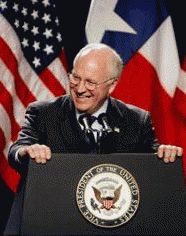White House assertion of terror network in Iraq may undermine own case for war
 WHY IS THIS WAR MONGER LAUGHING?
WHY IS THIS WAR MONGER LAUGHING?Ft. Worth TX.- Vice President Dick Cheney, speaking at fund-raisers on Monday, offered his rationale for the American presence in Iraq. "Iraq has now become the central front in the war on terror," he said at a Bush-Cheney fund-raiser in Cleveland and at a fund-raising reception for Rep. Anne Northrup in Louisville, Ky. "We are aggressively striking the terrorists in Iraq, defeating them there, so we do not have to face them on the streets of our own cities."
It's a line that generates applause. It's also a line that makes several military and intelligence analysts cringe. They say it gives the impression that those carrying out terrorists acts against United States and allied forces are internationally organized with the power and reach to wage war on America's shores.
As Cheney and President Bush use the rhetoric, some experts say the White House is giving Americans a false impression of who the terrorists in Iraq are and their reasons for conducting deadly attacks. "Militarily, their statements are almost absurd," said Anthony Cordesman, a national security and military intelligence expert for the Center for Strategic and International Studies. "There is no evidence of activity … by extremist terrorist groups affiliated with al-Qaida."
The line from the Bush administration and similar ones from some of the Democratic presidential challengers reflect a difference of opinion between politicians and soldiers in the field, Cordesman said. White House officials say the line captures the essence and the urgency to defend America from the nontraditional, guerrilla-type warfare that's becoming an everyday occurrence in Iraq.
A senior administration official, who spoke on condition of anonymity, said Bush and Cheney's remarks reflect the belief that there are "al-Qaida or al-Qaida types" behind the terrorism in Iraq. "The president, (Defense Secretary Donald) Rumsfeld, (Gen. John) Abizaid have talked about foreign fighters on Iraq soil, foreign jihadists' will to inflate terror," the official said.
But Cordesman and other analysts say military officials in Iraq already have an idea where the bulk of the terrorist threat there is coming from: the locals. Abizaid, the top military official in the region, told reporters two weeks ago that most of the resistance and violence in Iraq have been spawned by former members of Iraq's Baath Party and other groups loyal to former Iraqi President Saddam Hussein, who are waging a low-intensity war to return him to power. Abizaid said the resistance may only number 5,000, but they are a dedicated and dangerous bunch.
"It doesn't take a large group of people to commit terrorist acts," the senior administration official said. "The clear and most dangerous enemy to us at the present time are the former regime loyalists, the Baathist cells that operate in the areas primarily of Baghdad, Fallujah, Tikrit, Mosul, Kirkuk, and conduct operations against us primarily through the use of improvised explosives devices, mortars, rocket-propelled grenades and, very infrequently but sometimes, small-arms fire," Abizaid said.
In addition, the Baathists have hired criminals "to do their dirty work" and work with a small but well-organized group of foreign fighters, according to Abizaid. Cordesman estimated that about 95 percent of the terrorist threat is from Saddam loyalists.
The argument by Bush and Cheney that fighting the terrorist threat in Iraq will help keep terrorists away from American cities diminishes the White House's original stance for going to war, said Michael O'Hanlon, a military analyst for the Brookings Institution. Bush initially said that Saddam's brutality toward his own people, his decision to ignore countless United Nations resolutions and the pursuit of weapons of mass destruction that threatened to destabilize the Middle East justified going to war.
By now describing the war as an effort to get the terrorists before they get to America, "the administration, in a strange way, discredits its own case," O'Hanlon said. "It's a weak argument," he said. "There aren't that many in Iraq who are foreign fighters who are a threat to U.S. shores. I don't know if it's fear-mongering or false re-assuring."
Cordesman and others say that Americans won't get the full story on the war on terrorism as long as the White House keeps talking about Iraq as a beachhead. "It doesn't prepare the American people for a war forced on us to fight, for its length, its intensity and risks," he said. "It's the kind of politics that gets you through two weeks."
This is the same lying and posturing that Bush and Cheney used to lead us in to this war.
 WHY IS THIS WAR MONGER LAUGHING?
WHY IS THIS WAR MONGER LAUGHING?
